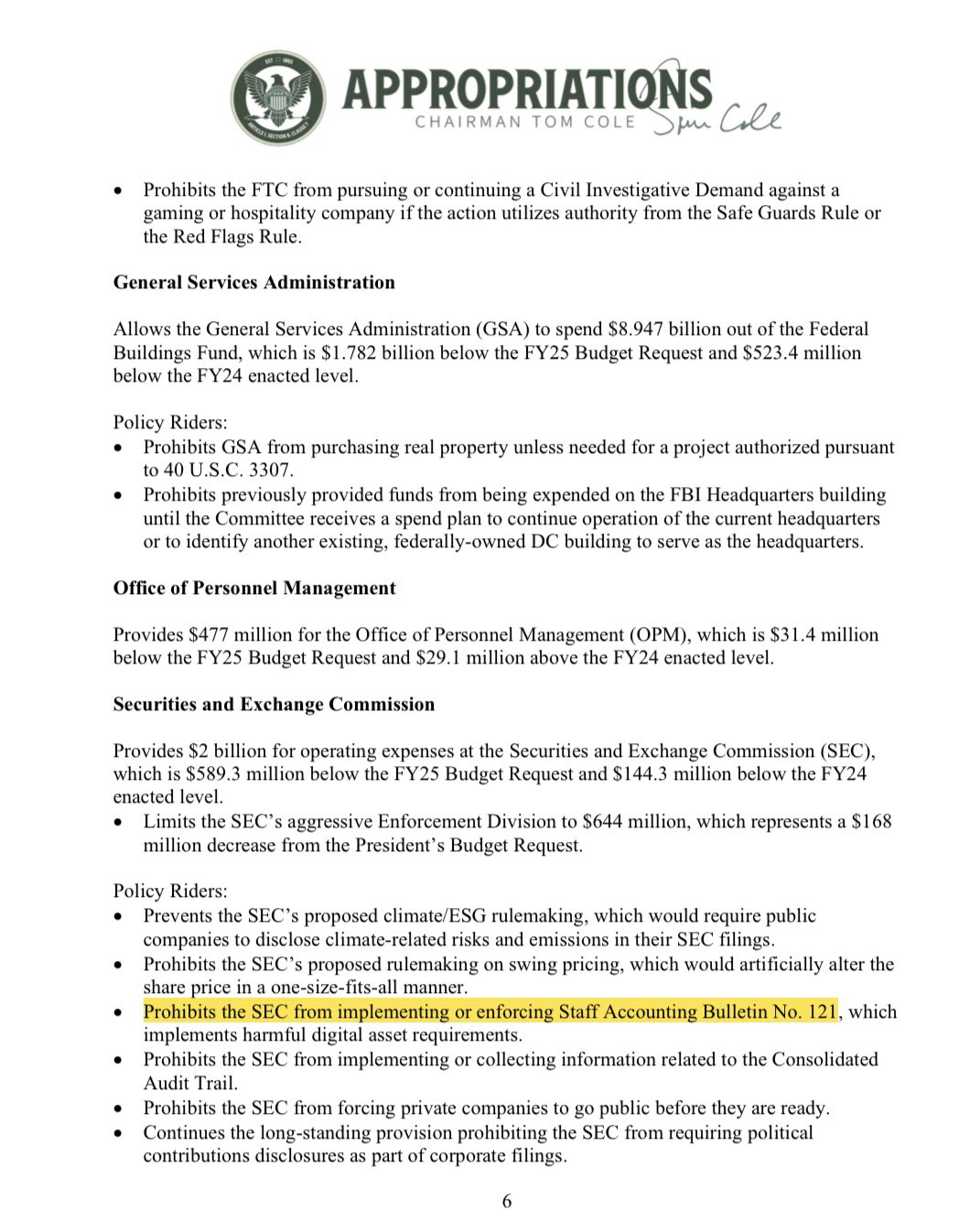ARTICLE AD
SEC Commissioner Uyeda criticizes SAB 121's introduction, citing procedural concerns.
The House Appropriations Subcommittee on Financial Services and General Government, scheduled for 8:30 AM ET today, could prohibit the US Securities and Exchange Commission (SEC) from using allocated funds to implement SAB 121 and its climate disclosure rule, according to FOX Business journalist Eleanor Terrett.
 A policy rider that specifically prevents the SEC from using allocated funds to implement SAB 121 – Source: Eleanor Terrett
A policy rider that specifically prevents the SEC from using allocated funds to implement SAB 121 – Source: Eleanor TerrettTerrett said the bill proposes to allocate only $2 billion for the SEC’s overall funding for fiscal year 2025, short of the $2.59 billion budget proposed by SEC Chair Gary Gensler in March.
Additionally, funding for the SEC’s Enforcement Division, described as “aggressive,” is being cut by $168 million.
While the House is likely to pass the bill, the Senate’s stance remains uncertain. However, the outlook is still optimistic since some Senate Democrats, including notable figures like Senator Schumer, have previously voted to overturn SAB 121, Terrett noted. Further, a similar past resolution, H.J. Res. 109, gained some Democratic support.
This bipartisan support increases the likelihood that the provision to block funding for SAB 121 will remain in the final version of the bill.
According to Terrett, SEC Commissioner Mark Uyeda has publicly supported overturning SAB 121, criticizing the SEC’s method of introduction as bypassing proper rulemaking procedures and undermining checks and balances.
Issued in March 2022, Staff Accounting Bulletin No. 121 (SAB 121) requires banking and financial associations performing custodial activities to include disclosures in the notes to the financial statements.
Financial entities have argued that the on-balance sheet requirement coupled with the need to hold capital and liquidity reserves makes it prohibitively expensive for them to offer these services.
In May, the US House and Senate passed H.J. Res. 109, aiming to overturn the SEC’s controversial rule, with the Senate finalizing their approval on May 16.
However, President Biden vetoed this resolution on May 31, citing concerns that it would undermine the SEC and pose risks to consumers and investors.
The information on or accessed through this website is obtained from independent sources we believe to be accurate and reliable, but Decentral Media, Inc. makes no representation or warranty as to the timeliness, completeness, or accuracy of any information on or accessed through this website. Decentral Media, Inc. is not an investment advisor. We do not give personalized investment advice or other financial advice. The information on this website is subject to change without notice. Some or all of the information on this website may become outdated, or it may be or become incomplete or inaccurate. We may, but are not obligated to, update any outdated, incomplete, or inaccurate information.
Crypto Briefing may augment articles with AI-generated content created by Crypto Briefing’s own proprietary AI platform. We use AI as a tool to deliver fast, valuable and actionable information without losing the insight - and oversight - of experienced crypto natives. All AI augmented content is carefully reviewed, including for factural accuracy, by our editors and writers, and always draws from multiple primary and secondary sources when available to create our stories and articles.
You should never make an investment decision on an ICO, IEO, or other investment based on the information on this website, and you should never interpret or otherwise rely on any of the information on this website as investment advice. We strongly recommend that you consult a licensed investment advisor or other qualified financial professional if you are seeking investment advice on an ICO, IEO, or other investment. We do not accept compensation in any form for analyzing or reporting on any ICO, IEO, cryptocurrency, currency, tokenized sales, securities, or commodities.

 4 months ago
22
4 months ago
22 

